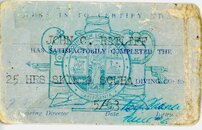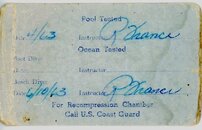A very good post. I will comment on some minor detail here.
Some wrecks can be more dangerous places than some caves. There are razor sharp edges and spikes in wrecks that can tear your drysuit and let the icy waters in. We know how that ends. There could be all kinds of stuff floating around too - a major entanglement hazard - and it's not cave line. You cannot cut cable or wire unless you were insightfull enough to bring wire cutters with you. Older wrecks might be on the brink of collapsing and entrapping the unwary. A cave diving course cannot fully prepare one for penetration wreck dives. Further study is needed. It could be books, though. I'm not a tech wreck diver, but I did do some private study.
Mine diving also sounds so simple, but do you know the mining methods used and the type of rock and the dangers they pose? Mines, too, contain cables and wires and sharp edges. And rotten pillars. Don't get buried in a collapse. I know a mine that has acidic water so if you dive there a lot the chrome plating of your 1st stages is soon gone. Not a place to do mask removal drills. There's a need for specific knowledge on mines. You might not need a course if you read enough.
The PADI nitrox course did not bring any new info, unless the knowledge of oxygen cleanness for partial pressure fills counts as one. That could have been explained in one or two sentences though, so what's the reason for a nitrox class? Well, profitability! The instructor needs to make a living, which I believe is a fair demand. I do not teach for money, so this opinion is impartial.
If you only take PADI courses, then you'll need that nitrox class too.
[Edit: and dive centres / filling stations require a nitrox card if you want a nitrox fill]
Getting the cylinders properly trimmed requires some help from another knowledgeable sidemount diver. I've been in a situation where an experienced ocean diver had badly fitted sidemount gear. It was a disaster. We can skip the siltout stuff, that's not bad, we can dive by touch, and there is line, but the unconscious diver in the ceiling part was nasty. Fundies doesn't make you a sidemount diver, ok? Contingency planning is also critically different from backmount. I would recommend sidemount courses, the tech ones, not the fun ones.
"AQUEOUS DIVER FIRST CLASS.
This diver is certified to dive in water and in all kinds of aqueous solutions, with the possibility of suspended matter, to any depth, in any temperature and visibility and current, during both day and night, alone or in groups, with his/her choice of equipment and/or suit or without either. No ceiling, hard of soft, nor marine life nor night life, shall limit his/her right to dive and all life sustaining breathing gasses are allowed, would the diver choose to bring expendable gasses. This certification gets automatically revoked in the case of a diving related death. This diver is completely self reliant to the point that no-one can be held responsible for any mishap this elevated individual might encounter. Would he/she die, it would certainly be his/her free choice."
Certification cards available from me for USD 2999.
Yes and no.So with a full cave cert you can do also technical wreck and mines.
Some wrecks can be more dangerous places than some caves. There are razor sharp edges and spikes in wrecks that can tear your drysuit and let the icy waters in. We know how that ends. There could be all kinds of stuff floating around too - a major entanglement hazard - and it's not cave line. You cannot cut cable or wire unless you were insightfull enough to bring wire cutters with you. Older wrecks might be on the brink of collapsing and entrapping the unwary. A cave diving course cannot fully prepare one for penetration wreck dives. Further study is needed. It could be books, though. I'm not a tech wreck diver, but I did do some private study.
Mine diving also sounds so simple, but do you know the mining methods used and the type of rock and the dangers they pose? Mines, too, contain cables and wires and sharp edges. And rotten pillars. Don't get buried in a collapse. I know a mine that has acidic water so if you dive there a lot the chrome plating of your 1st stages is soon gone. Not a place to do mask removal drills. There's a need for specific knowledge on mines. You might not need a course if you read enough.
Our CMAS one star course explained ppO2 and the maximum recommended values.As already written earlier, there are useful diving courses like ow, nitrox, cave, trimix, etc.
The PADI nitrox course did not bring any new info, unless the knowledge of oxygen cleanness for partial pressure fills counts as one. That could have been explained in one or two sentences though, so what's the reason for a nitrox class? Well, profitability! The instructor needs to make a living, which I believe is a fair demand. I do not teach for money, so this opinion is impartial.
If you only take PADI courses, then you'll need that nitrox class too.
[Edit: and dive centres / filling stations require a nitrox card if you want a nitrox fill]
And I did, and I also assembled my kit myself, and hours upon hours of GoPro footage and one serious incident later I had deep knowledge on the subject. Today there are nice courses available and I would recommend them.sidemount, you can learn yourself,
Getting the cylinders properly trimmed requires some help from another knowledgeable sidemount diver. I've been in a situation where an experienced ocean diver had badly fitted sidemount gear. It was a disaster. We can skip the siltout stuff, that's not bad, we can dive by touch, and there is line, but the unconscious diver in the ceiling part was nasty. Fundies doesn't make you a sidemount diver, ok? Contingency planning is also critically different from backmount. I would recommend sidemount courses, the tech ones, not the fun ones.
Yes. We all want this certification:And I solved this problems and discussions with an 'Everything diver instructor' card.
This also means you can dive solo.

"AQUEOUS DIVER FIRST CLASS.
This diver is certified to dive in water and in all kinds of aqueous solutions, with the possibility of suspended matter, to any depth, in any temperature and visibility and current, during both day and night, alone or in groups, with his/her choice of equipment and/or suit or without either. No ceiling, hard of soft, nor marine life nor night life, shall limit his/her right to dive and all life sustaining breathing gasses are allowed, would the diver choose to bring expendable gasses. This certification gets automatically revoked in the case of a diving related death. This diver is completely self reliant to the point that no-one can be held responsible for any mishap this elevated individual might encounter. Would he/she die, it would certainly be his/her free choice."
Certification cards available from me for USD 2999.





